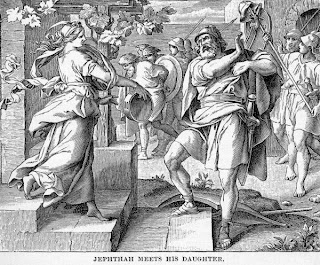OK, I’m looking for some help from my theologian friends (and other wanna-be’s like me.) At Mass this morning, a friend and I debated the first reading, which is quite disconcerting.
Here is the reading which comes from Judges 11: 29-39. I bolded the main plot:
“The Spirit of the LORD came upon Jephthah.
He passed through Gilead and Manasseh,
and through Mizpah-Gilead as well,
and from there he went on to the Ammonites.
Jephthah made a vow to the LORD.
“If you deliver the Ammonites into my power,” he said,
“whoever comes out of the doors of my house
to meet me when I return in triumph from the Ammonites
shall belong to the LORD.
I shall offer him up as a burnt offering.”Jephthah then went on to the Ammonites to fight against them,
and the LORD delivered them into his power,
so that he inflicted a severe defeat on them,
from Aroer to the approach of Minnith (twenty cities in all)
and as far as Abel-keramim.
Thus were the Ammonites brought into subjection
by the children of Israel.
When Jephthah returned to his house in Mizpah,
it was his daughter who came forth,
playing the tambourines and dancing.She was an only child: he had neither son nor daughter besides her.
When he saw her, he rent his garments and said,
“Alas, daughter, you have struck me down
and brought calamity upon me.
For I have made a vow to the LORD and I cannot retract.”
She replied, “Father, you have made a vow to the LORD.
Do with me as you have vowed,
because the LORD has wrought vengeance for you
on your enemies the Ammonites.”Then she said to her father, “Let me have this favor.
Spare me for two months, that I may go off down the mountains
to mourn my virginity with my companions.”
“Go,” he replied, and sent her away for two months.
So she departed with her companions
and mourned her virginity on the mountains.
At the end of the two months she returned to her father,
who did to her as he had vowed.”
My friend simply thinks Jephthah, following the pagan system of sacrifice, made a monumental mistake. He doesn’t see the story as redemptive in any way and thinks it was meant to stand as a warning of precisely the wrong way to please God. There is some liturgical evidence for his interpretation, especially in today’s Psalm–“sacrifice or oblation you wished not”.
I, on the other hand, saw it through the spiritual lens and came to a different conclusion. Jephthah, with his filial sacrifice, echoes Abraham who obeyed God’s order to sacrifice his own child. The command pained Abraham deeply yet he relinquished his desires at the altar of obedience. I also see hints of Herod promising his step-daughter whatever she wanted, only to be distressed by her demand of John the Baptist’s head. In each of these stories, the protagonist acts in obedience despite his conflicting desires.
Even more poignantly, though, I see in Jephthah a prefigurement of God the Father, hesistantly and with great anguish offering his son for the sake of the world. This reading aligns Jesus with Jephthah’s daughter, who embraces her sacrifice with Christ-like obedience. Her “do with me as you have vowed” parallels the agonizing “not what I will but what you will” that spills from Jesus’ lips.
My friend and I are both totally aware that all of Scripture can be read through different senses–thanks Mark Shea!–only he is convinced that there is no underlying spiritual meaning in this particular passage.
So as two amateur theologians wrestle with this story, I’d love to hear other interpretations. How did the Church fathers read this passage? How have different saints and biblical scholars interpreted it?
What interpretations have you seen? And what do you think about it?

